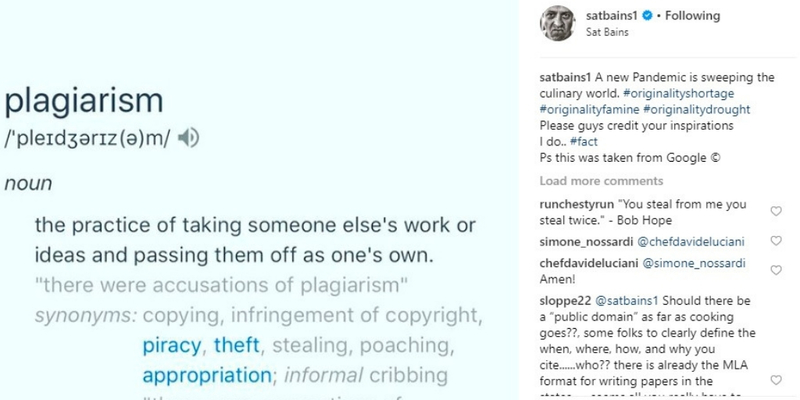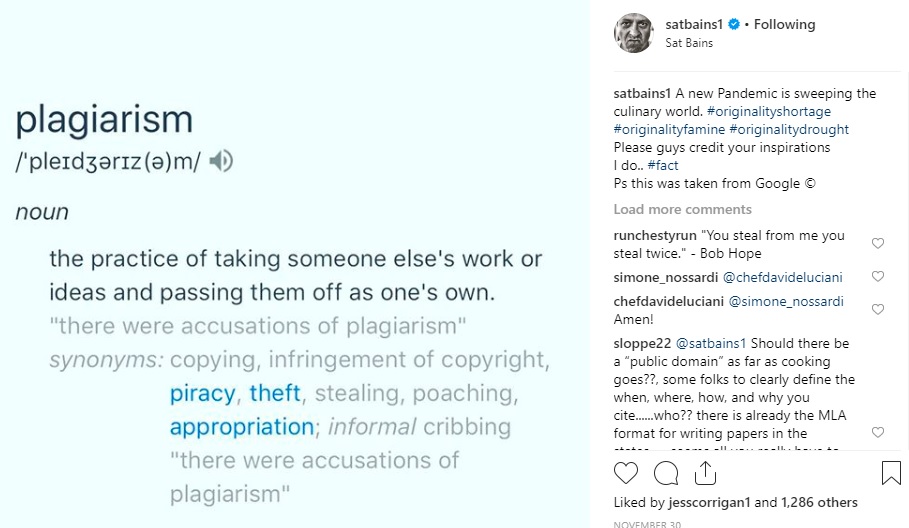Plagiarism in Hospitality: Flattery or Theft
Is there an originality crisis hitting the the UK's professional kitchens? Sat Bains thinks so! But can dishes can be plagiarised in the modern world of social media sharing?
Plagiarism is a commonly used word, whether it's in reference to students copying copious amounts of text from Wikipedia to flesh out their assignments or musicians 'borrowing' lyrics, we hear it all the time. But it is not as often associated with chefs and the restaurant trade.
In an industry which has opened itself up and embraced the sharing of ideas especially across social media and in cookbooks giving step by step instructions to replicate a chefs ideas, is plagiarism a real concern?
Sat Bains, two Michelin-starred chef and owner of Restaurant Sat Bains, recently posted on Instagram an image simply showing the definition of plagiarism.
While the reason for the post is not apparent and Sat's PR company declined to comment, it has sparked debate regarding both the proclivity and severity of plagiarism in the restaurant trade. Sat said: "A new Pandemic is sweeping the culinary world. #orginalityshortage #originalityfamine #originalitydrought. Please guys credit your inspirations. Ps this was taken from Google ©️."
Following this post The Staff Canteen took to social media to ask our followers if they agree and if they think dishes can be stolen or plagiarised. An overwhelming 66% of respondents said yes, with just 21% disagreeing and 13% sitting on the fence and saying that it depends.
Chefs, do you think that dishes can be stolen/plagiarised? Let us know your experiences by getting in contact! #chefs #plagiarism #cooking ????????????????????
— The Staff Canteen (@CanteenTweets) December 4, 2018
So why are more chefs not raising their concerns? It could be as a result of the complexity of the issue as a whole, it very quickly descends into copyright and intellectual property law, which means that it is not a very clear cut concept.
The Guardian posted a report back in 2006 saying that a dish can in fact be patented, however it would have to ‘substantially different from anything that had been done before’. This raises a number of questions, firstly what would make a dish substantially different? This is especially important as a number of the respondents to the Twitter poll we conducted said that ‘you can’t reinvent the wheel’.
The Nosey Chef @noseychef said: "I work with copyright in my day job and was once asked to find a recipe for diabetics, so I did the legal on it. Recipes are not covered by copyright because they are a set of instructions to create a thing. Supporting articles (description, history, origin) are copyrighted. Fact."
Another issue is that food is continually evolving, so it is possible that a recipe has been thought of somewhere in the world but not become well-known. For example, some say that pizza was created in 1889 by Raffaele Esposito, others say it wasn't and John D Thogerson on Facebook points out: "What makes it yours? When has food solely belonged to one preparer (sic)? Who was the first pasta maker? Are we not plagarizers by trade? The first pizza? The first tomato sphere? Maybe you were the first. But won't be the last...".
He said: "It looks great even with same garnishes ingredients what’s the point if it tastes like shite! On the other hand is it a dish you learnt with a previous chef you worked with and then put it on your menu? Is that not the ultimate compliment?"
The uncertainty over what is and isn't plagiarism makes sense as in the past people were not able to be constantly connected like we all are today. Being able to look up and post a recipe in a few clicks is still a relatively new development.
This is not the only industry where design is copied and replicated at different levels - Mrs P @vegasvic2005 points out: "Happens in the fashion world all the time. We can’t all afford the top labels. Why on earth do you think Rola Cola ever existed? Same thing."
As the world of cooking keeps updating, what are the experiences of today’s chefs? Some chefs say they have had their whole menu plagiarised, or dishes that took months to perfect stolen. One chef mentioned the idea of presenting a menu or dish at a trial only to have it appear on that menu a few weeks later.
It is apparent that plagiarism in cooking is not black and white. Some chefs think it is a crime, others think that it helps to progress the industry. What do you think? Let us know in the comments below or on social media!
By Cameron Huck



{{user.name}}